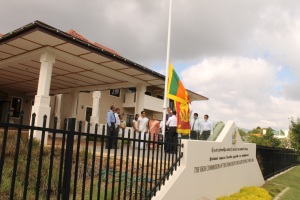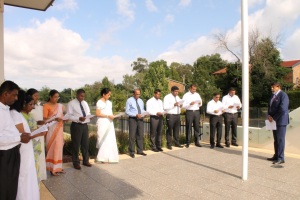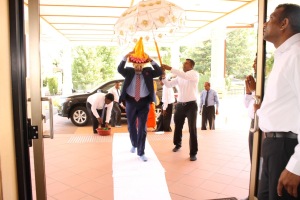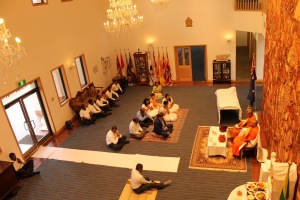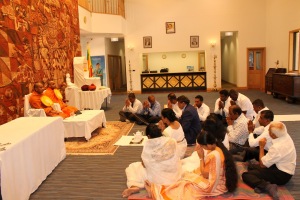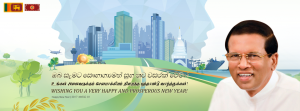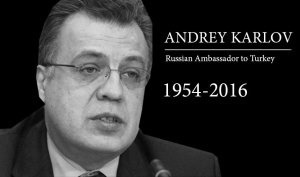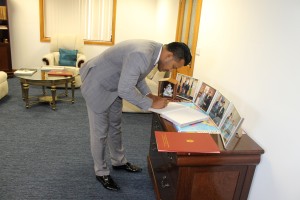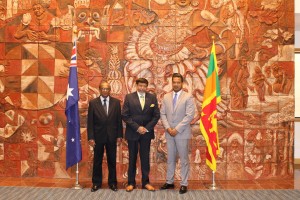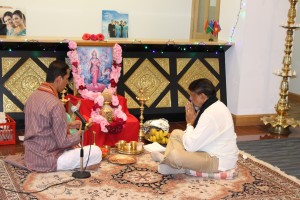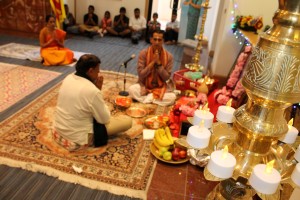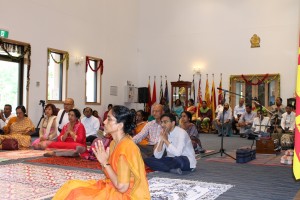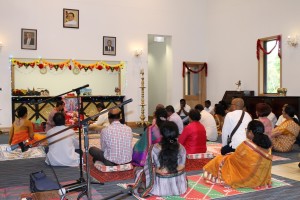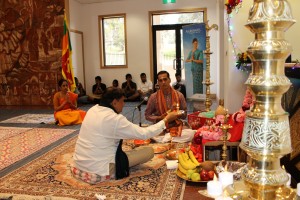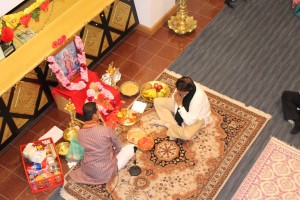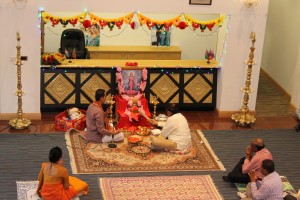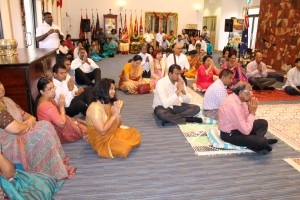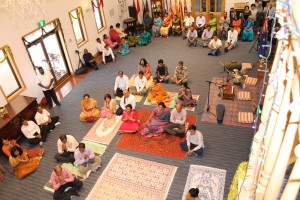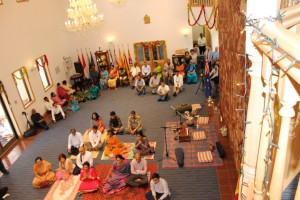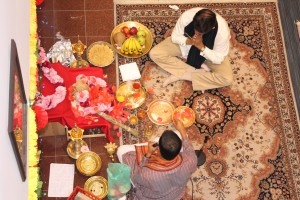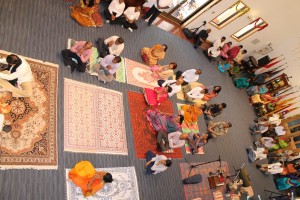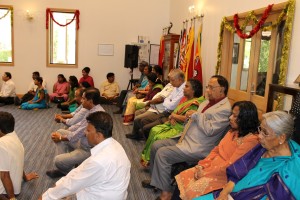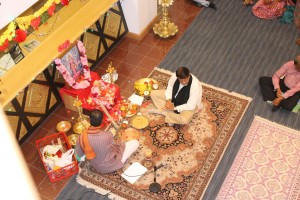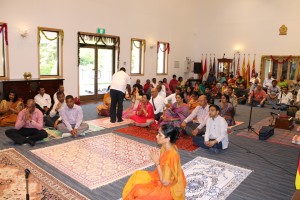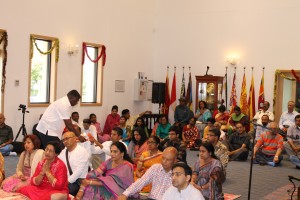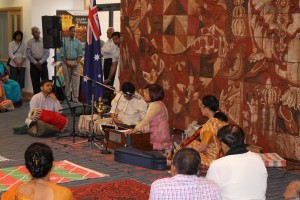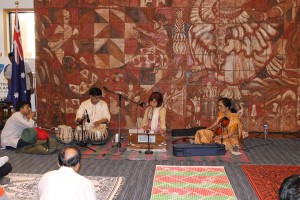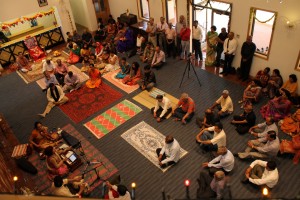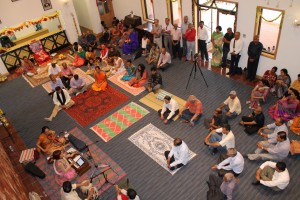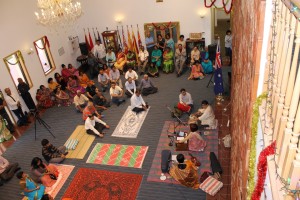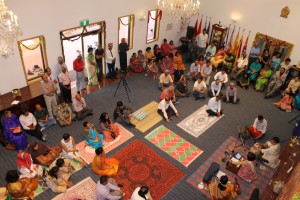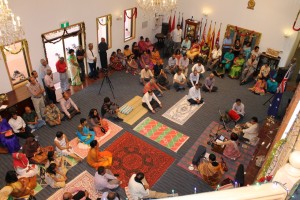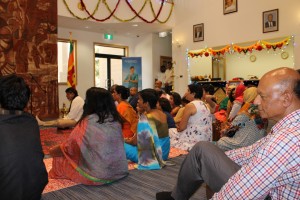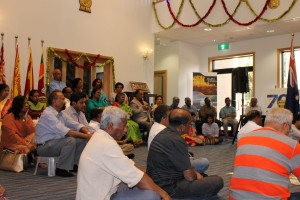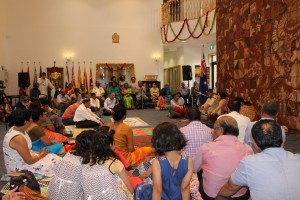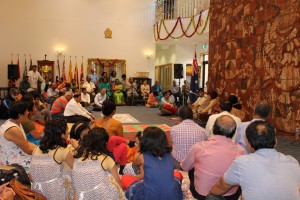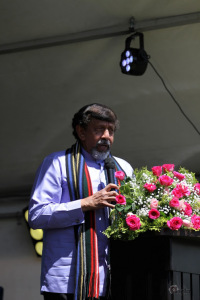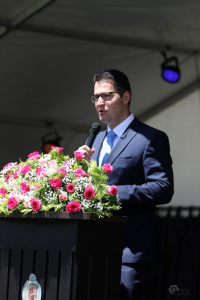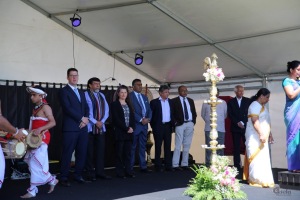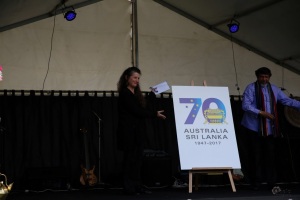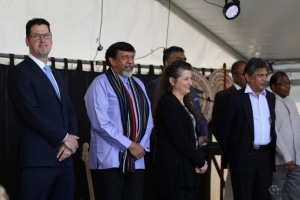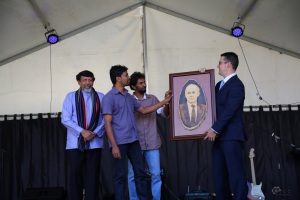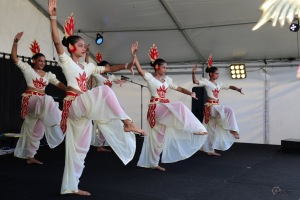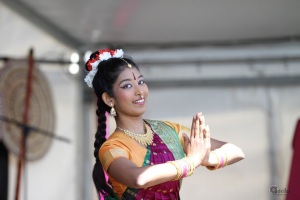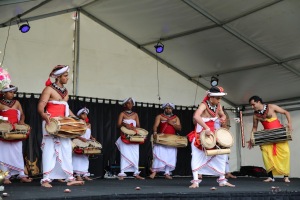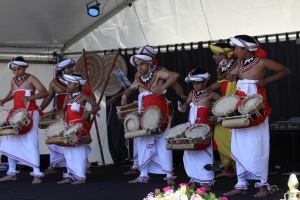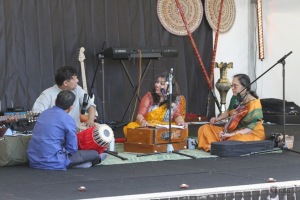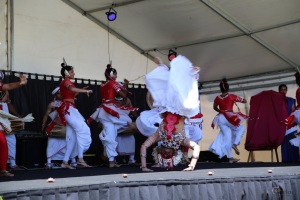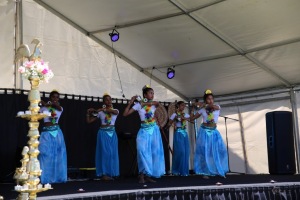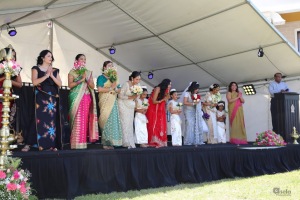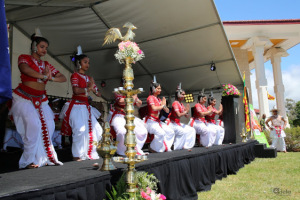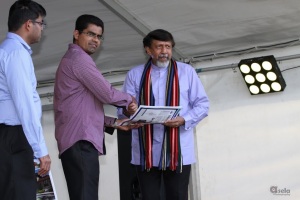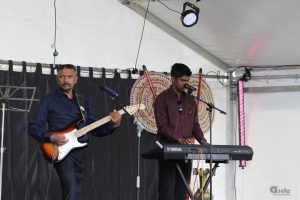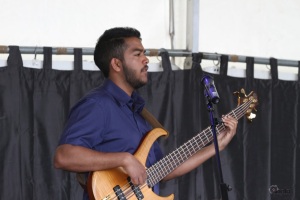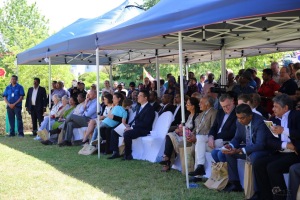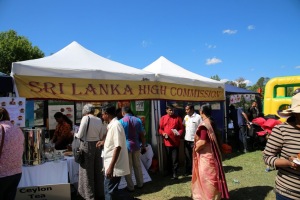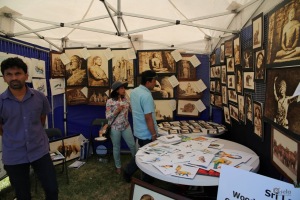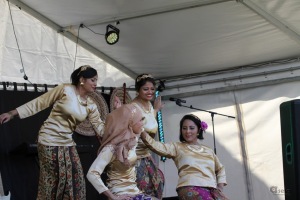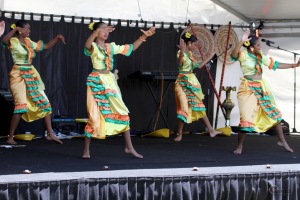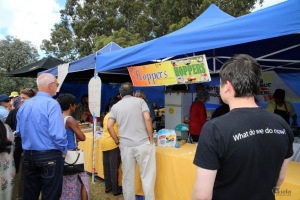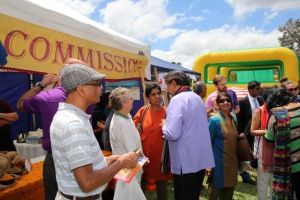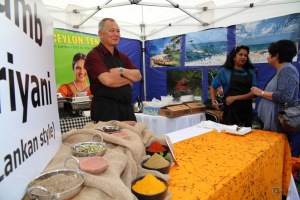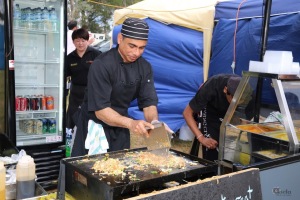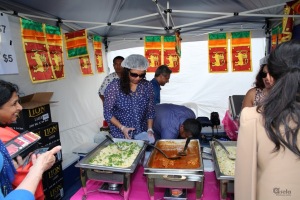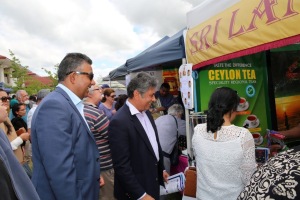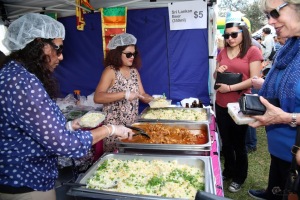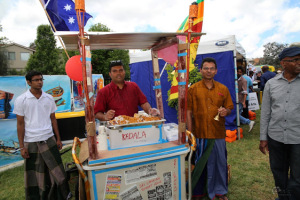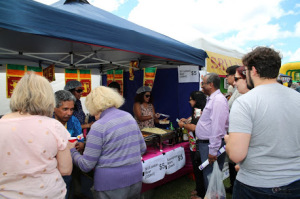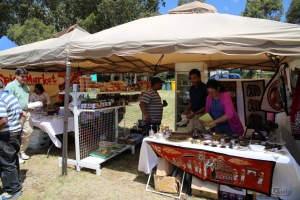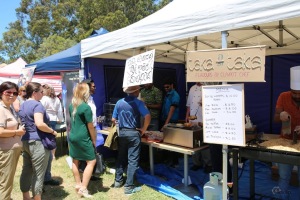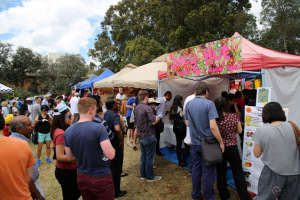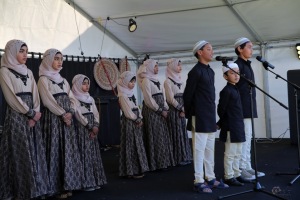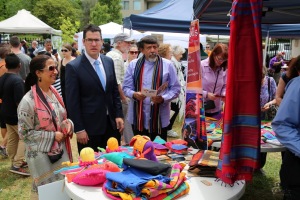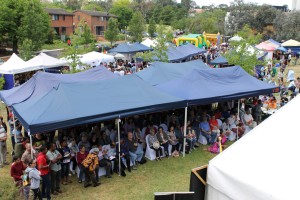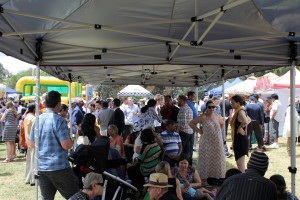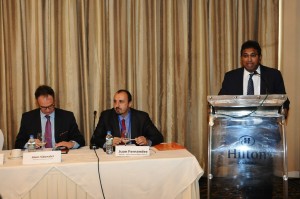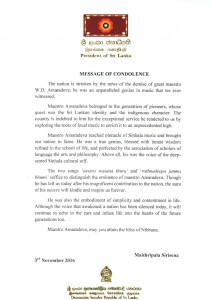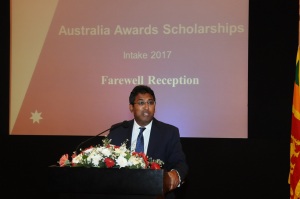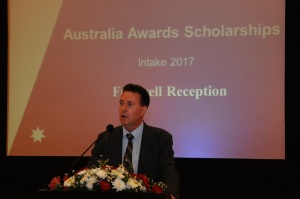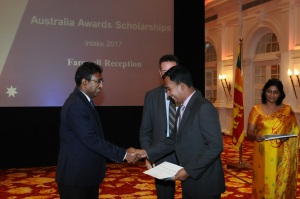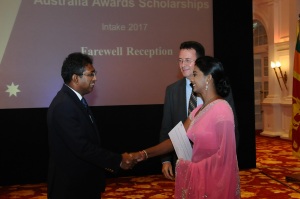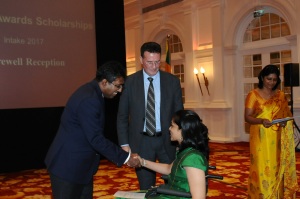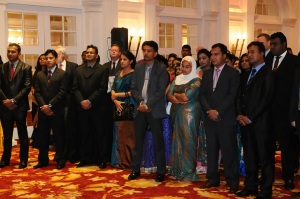


Commencement of Work in 2017 by the Sri Lanka High Commission in Canberra
January 3, 2017
The High Commission commenced work on the first working day of 2017 on 2nd January, by hoisting of the National Flag, singing the National Anthem and affirming the Oath of the Public Servants by all staff. A two minutes’ silence was observed to commemorate members of the armed forces and all others who sacrificed their lives on behalf of the motherland.
Thereafter the High Commissioner made brief remarks on the importance of serving the public with honesty, integrity and commitment at all times. The High Commissioner underlined the need for all staff to remember at all times, that they are public servants paid by the people of Sri Lanka. They must therefore contribute towards meeting the Government’s goals and policies in developing Sri Lanka as one country, under one flag, with unity and harmony, while working towards alleviate poverty in 2017.
The High Commission staff, together with the two Buddhist Associations in Canberra also offered mid day alms to the Venerable resident monks of the Sri Lanka Buddhist Vihara in Canberra. The main purpose of the alms giving was to thank the two priests, the Ven. Moragollagama Rahula Panditha Thero and Ven. Veragoda Sujatha Panditha Thero, before their return to Sri Lanka in early 2017, for their services to the community in fostering unity and harmony and promoting reconciliation. The Ven. Theros also invoked blessings on; the High Commissioner and the staff to continue their close cooperation with the Sri Lankan community; the Government of Sri Lanka which has now been in office for 2 years to give it strength in bringing peace and development to the country; and on all people of Sri Lanka for a peaceful and prosperous year in 2017.
Sri Lanka High Commission in Canberra
3rd January 2017
New Year Message from His Excellency Maithripala Sirisena , President of Sri Lanka
January 1, 2017
The year 2017 dawns with new hopes of prosperity, coexistence and reconciliation in our hearts. The twenty two million people of Sri Lanka look forward to an era of sustainability with a determination to alleviate poverty in all its forms.
It is imperative that we overcome the challenges ahead of us. The progress of the human race was pioneered by people who faced challenges with confidence, utmost courage and determination amidst obstacles. Our goals could be achieved if we manage our work efficiently and productively, and do the right thing at the right time with unwavering commitment to serve the greater good.
The adverse effects of climate change show us the imperative need to be prepared for weather uncertainties. We have to be determined this year to live with nature and not above or against it.
I wish all of you a prosperous new year in which the fruits of progress are distributed fairly and the aspirations of the people are fulfilled.
Maithripala Sirisena
President
Sri Lanka condemns the assassination of the Ambassador for Russia to Turkey
December 21, 2016
Sri Lanka condemns, unequivocally and in the strongest terms, the assassination of the Ambassador for the Russian Federation to the Republic of Turkey, in Ankara, on 19 December. The Government of Sri Lanka extends deepest condolences to the family of Ambassador Andrey Karlov, and the Government and people of the Russian Federation.
Sri Lanka denounces terrorism in all its forms and manifestations. No cause or reason justifies terrorism, and we condemn this dastardly act as a heinous assault on the rights and immunities of all diplomats to represent their nations in safety and security around the world. While urging the authorities concerned to take all necessary action to ensure that those responsible are brought to justice we emphasize the need for the international community to work together to uphold and safeguard the rights and immunities of diplomats of all nations and international organisations in carrying out their work.
Ministry of Foreign Affairs of Sri Lanka
Colombo
20 December 2016
Christmas celebration at the Sri Lanka High Commission in Canberra
December 16, 2016
Christmas was celebrated at the Sri Lanka High Commission in Canberra with the participation of the Sri Lankan community on 15thDecember 2016.
Rev. Father Isuru Weliwatte from Melbourne delivered a blessing and a Christmas message highlighting the true meaning of Christmas. He pointed out that the modest surroundings in which Baby Jesus was born teach us humility which is the true spirit of Christmas.
First Honoray Consul for Sri Lanka in the Solomon Islands
November 24, 2016
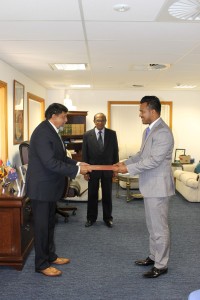
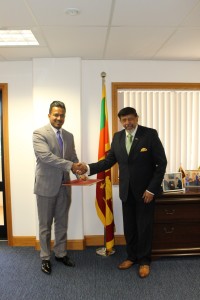
Mr. Kutila Pinto has been appointed as Sri Lanka’s first Honorary Consul in the Solomon Islands. He received his Commission of Appointment from High Commissioner Somasundaram Skandakumar in Canberra on 24th November.
Mr Pinto comes with a background in banking and is presently the Executive Director of the Pan Oceania Bank in Honiara. He has expressed a vision to expand the relations between the two countries and attract Sri Lankan investors to Solomon Islands, notably in the tourism sector.
Mr Pinto can be contacted at:
PO Box 855
Unit F1 & F2, First Floor
Grand Plaza Building
Town Ground, Honiara
Solomon Islands
Dedicated Number +677 42222
Mobile no: +677 7496723
E mail : kutilap@pob.com.sb
Sri Lanka High Commission
Canberra
24 Nov. 2016
High Commission celebrated Deepavali with Canberra community
November 21, 2016
Deepvali was celebrated at the Sri Lanka High Commission in Canberra with the participation of the Sri Lankan community on Sunday 20th November.
Religious ceremony was conducted by Pandith Pradeep Bhat of the Vishnushiva Mandir. High Commissioner Skandakumar in welcoming the guests observed that the ‘Festival of Lights’. celebrated the triumph of good over evil and the emergence of light over darkness.” As we approach the end of yet another year, and reflect upon it “, he wished everyone the true blessings of Deepavali in the year ahead. Thereafter the guests were treated to a music performance coordinated by the Tamil community in Canberra followed by a reception with traditional snacks and Sri Lankan tea.
Sri Lanka Festival 2016 draws unprecedented crowds in Canberra
November 14, 2016
Canberra community came in large numbers to savour a bit of Sri Lanka at the Sri Lanka Festival organised by the High Commission on Saturday 12th November in the High Commission premises. Over 3000 people representing the Commonwealth and Australian Capital Territory (ACT) governments, diplomatic corps, and the local community visited the Festival and enjoyed Sri Lankan food, culture and crafts of Sri Lanka.
Australian Assistant Minister for Social Services and Multicultural Affairs Senator Zed Seselja was the Chief Guest. Former Sri Lanka cricketer Asanga Gurusinghe travelled all the way from Melbourne to be present at the Festival. Addressing the Opening Ceremony, the Assistant Minister emphasised the importance of multiculturalism for Australia, and congratulated the High Commission and the Sri Lankan community for coming together in promoting Sri Lanka.
High Commissioner Somasundaram Skandakumar in his welcome address appreciated the participation and contribution of all Sri Lankan communities in Canberra which made the event truly Sri Lankan and depicted the diversity of Sri Lankan society. The High Commissioner also thanked the participation of cultural groups from Canberra and Sydney adding colour to the Festival and entertaining the visitors throughout the day. He particularly underlined the collective effort of the High Commission and the Sri Lankan community that contributed to the success of the event. Volunteers played a valuable role in selling raffle tickets, managing and supervising the children’s play area, conducting creative activities for children, face painting, providing medical and nursing care, compering, photo and video recording of the event, technical skills with sounds and electric supply and by assisting in innumerable other ways. Many Sri Lankans commended the effective organising of the event while one senior member of the community described it as “the most successful event held in Canberra witnessed since 1974”.
A portrait of the Australian Prime Minister Malcolm Turnbull done on wood using pyrography was presented to the Chief Guest by artists Malaka and Mahesh from Thermal Arts, who had come all the way from Sri Lanka to take part in the Festival.
The official logo for the celebration of the 70th anniversary of diplomatic relations between Sri Lanka and Australia in 2017, designed by the Department of Foreign Affairs and Trade (DFAT), was launched at the Festival by the First Assistant Secretary for South and West Asia Division of DFAT Ms. Kathy Klugman and High Commissioner Skandakumar. First Assistant Secretary Klugman, who is a former High Commissioner to Sri Lanka, briefly outlined the history of the relationship between the two countries while the High Commissioner mentioned some of the activities being planned in 2017 to commemorate 70 years of friendship.
The participation of two Sri Lankan companies showcasing art and handlooms and an astrologer were special features at the Festival. The High Commission, with the assistance of the Consulate General office in Sydney, conducted a tourism and tea promotion stall. Sri Lanka Tourism Promotion Bureau, Sri Lanka Tea Board and SriLankan Airlines contributed to the success of the event providing the stage, advertisements, raffle prizes, and promotional material.
Sri Lanka High Commission in Australia
Canberra,
14th November 2016
More photos : https://goo.gl/photos/DcckyPEHw4zxJz248
Remarks by Deputy Foreign Minister Dr. Harsha de Silva at Regional Consultations on Transitional Justice in Asia-Pacific
November 14, 2016
Remarks by Hon. Dr. Harsha de Silva. Deputy Minister of Foreign Affairs
Regional Consultations on Transitional Justice in Asia-Pacific
Hilton Colombo, 9 November 2016
UN Special Rapporteur on the promotion of truth, justice, reparation and guarantees of non-recurrence, Mr. Pablo de Greiff,
Acting UN Resident Coordinator Mr. Alain Sibenaler,
Officials from the Office of the High Commissioner for Human Rights,
Ladies and Gentlemen,
It is a pleasure to be here with you this morning, and I extend to all of you, a very warm welcome to Sri Lanka.
I understand that this meeting brings together State representatives, representatives of transitional justice mechanisms, national human rights institutions, NGOs, victims groups, UN officials, and representatives of regional organisations from the Asia-Pacific region to discuss and share experiences on transitional justice processes in the region.
I was informed that in accordance with the mandate given by the Human Rights Council to the Special Rapporteur, he was requested by the Council to gather relevant information on national situations, including on normative frameworks, national practices and experiences; identify, exchange and promote good practices and lessons learned; and recommend ways and means to improve and strengthen the promotion of truth, justice, reparation and guarantees of non-recurrence.
Accordingly, regional consultations have so far been held for the Middle East and North Africa, Latin America and the Caribbean, Africa, and Europe and North America. The region of the Asia-Pacific is the last on the list.
I feel that we are fortunate that by accident or by design, the consultations for the Asia-Pacific was kept to be done last, giving us this wonderful opportunity to welcome not only Mr. Pablo de Greiff, but all of you, to Sri Lanka.
As you all know, since the election of President Maithripala Sirisena in a historical Presidential election last January, Sri Lanka has embarked on a process of reconciliation. The two main political parties in Sri Lanka – the Sri Lanka Freedom Party led by President Sirisena and the United National Party led by Prime Minister Ranil Wickremesinghe have come together to forge a Government of National Unity. This is a step that is unprecedented in our nation’s history. In the words of President Sirisena in his inaugural address to Parliament following the General Election last August, this was a necessary step to obtain the bipartisan consensus that is required to face the important challenges before our nation, which include reconciliation and peacebuilding.
Therefore, Ladies and Genetlemen, this is an important moment in our history. We have acknowledged and recognised the need for reconciliation and the important contribution that transitional justice can make to this process of healing. Sri Lanka’s co-sponsorship of Resolution 30/1 titled ‘Promoting reconciliation, accountability and human rights in Sri Lanka’ is a manifestation of our strong commitment to this process.
Several initial steps in this long journey that we have embarked upon have been taken already. This includes the setting up, through an Act of Parliament, an Office on Missing Persons which is a component of the truth-seeking process. The legislation for this was enacted in August and the procedural steps for its establishment including the nomination of members by the Constitutional Council are now underway. A Task Force was appointed early this year, by the Government, comprising members of civil society, to hold public consultations, involving all stakeholders, to seek their views on the mechanisms for truth-seeking, justice and reparations.
This important process of national consultations has just concluded and the Task Force is scheduled to hand over their report to the President and the Prime Minister, this month. The designing of the truth-seeking, justice and reparations mechanisms will be informed by the report of this Task Force.
At the same time, we have undertaken a process of constitutional reform. A Resolution for the Parliament to sit as a Constitutional Assembly for this purpose was passed unanimously by our Parliament. The various drafting committees are presently at work.
Ladies and Gentlemen,
The processes that are underway here are in fact too numerous to list out and what I listed out are just a few.
For this process in Sri Lanka to be successful, we have to also ensure that the people of our country receive a quick economic peace dividend, and this is also an area on which we are focusing significant attention at the moment.
As contexts differ and there are no cookie-cutter models that can be adopted in sensitive processes such as transitional justice, this is a journey that our nation has to undertake and chart on its own. Yet, we cannot afford to experiment or make mistakes. Therefore, we rely on technical expertise as well as advice, and Pablo and the OHCHR officers have been excellent partners to us in our journey.
We have a long way to go and I am sure we have a lot to learn from best practices elsewhere. This is probably true for a lot of you here as well. Reconciliation is not a box that can be ticked or a journey that can end as per a timeline. There are no magic portions to achieve what we set out to achieve. It requires hard work and constant striving, and a commitment towards which our nation should be bound across generations. National building and healing are not tasks that have an end. This, we understand; and we want to ensure that after so many years of conflict, our nation does not plunge into conflict once again. So with this aim in mind, we set out on pursuing transitional justice to build a nation which respects and upholds the rights of each and every individual citizen of our country.
I wish your deliberations all success, and I hope that while you are here, you would also find the time to enjoy Colombo and Sri Lanka.
Thank you.
President’s condolence message on the demise of Great Maestro W D Amaradeva
November 4, 2016
Source : http://www.president.gov.lk/
Remarks by Deputy Foreign Minister Dr. Harsha de Silva at the Australia Awards Reception
November 4, 2016
Remarks by Hon. Dr. Harsha de Silva, MP. Deputy Minister of Foreign Affairs
at the Australia Awards Reception Galle Face Hotel, 2 November 2016
His Excellency High Commissioner Bryce Hutchesson,
President of the Sri Lanka Association of Australia Awards Alumni Ms. Indrani Sugathadasa,
Australia Awards Recipients,
Alumni,
Distinguished guests,
Ladies and Gentlemen,
I am happy to join you this evening to congratulate the 30 recipients of this year’s Australia Awards Scholarships, and while congratulating the recipients, I would also like to thank the Government of Australia for this generous and important Programme which contributes to skills and capacity development of Sri Lankans, while strengthening people-to-people contact between our two countries.
Australia and Sri Lanka are the best of friends, except perhaps on the Cricket field. Diplomatic relations between Australia and Ceylon were established in April 1947, even before we gained Independence. But ties between our peoples existed even before this. After all, Australians were seafarers and travellers, and Ceylon was a regular port of call.
The Australian Imperial Force visited Colombo en route to Egypt; and many veterans passed through Colombo on their way back home from war. An unfortunate few are buried on this tropical island.
Colombo, I am told is the first overseas cricket venue at which Sir Don Bradman played way back in 1930.
The stream of Sri Lankans who has made Australia their home over the years from the different communities has contributed to the diversity of Australia’s multicultural society, and has also made a mark on Australia’s economy, the arts, business, literature, the legal field, the culinary field, and even cricket.
Australia has been a strong development partner over the years, and I do not think there is any sector in which Australia hasn’t extended a helping hand to Sri Lanka at some point or another.
Australia has helped so many of our students, administrators, and professionals acquire the skills and knowledge they require to contribute to Sri Lanka’s progress.
All of you who go out to Australia shortly must all be very eager and enthusiastic about what awaits you. I am confident that you will take maximum advantage of this wonderful opportunity to not only learn and enrich your knowledge, skills and expertise, in your chosen fields, but to also be Ambassadors for your country during the time that you spend in Australia.
Benjamin Franklin, I am told, had said that the purpose of education is not only to serve yourself but to serve your community, your nation, and your world. In economics we call this a positive externality.
Looking at the list of 30, I was impressed by the diversity of the scholarship recipient in terms of the fields of study, from –
- law
- development studies
- Education
- public Policy
- Business Administration
- Disability Policy
- Conflict Management
- International Development
- Developing Economics
- Agriculture Economics
- Human Resources Management
- Governance
- Public Administration
- Women’s studies
- Education
- and commerceI hope that each of you, with the knowledge and the skills that you acquire through this Programme will go on to serve our nations and our world with distinction.High Commissioner Hutchesson, I must use this opportunity to say a special thank you to you and your team at the Australian High Commission in Colombo for the wonderful work that you do all year round to make our countries and our peoples draw closer.
Thank you.
Register with the High Commission
The Sri Lankan High Commission in Canberra would like to keep in touch with Sri Lankans and persons of Sri Lankan origin living in Australia, New Zealand, Fiji, Papua New Guinea, Vanuatu and other Pacific Islands as well as Sri Lankan community organisations in those countries.
If you are a current/former Sri Lankan or an office bearer of a Sri Lankan community organisation we invite you to register with the High Commission.
RegisterAddress
Sri Lanka High Commission
61, Hampton Circuit
Yarralumla
ACT 2600

